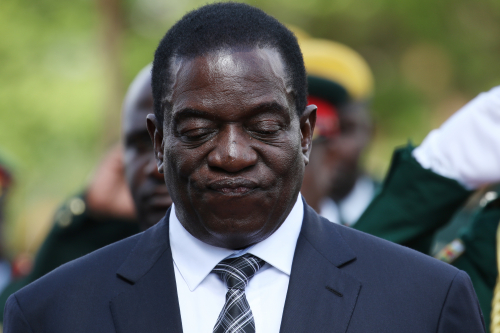
PRESIDENT Emmerson Mnangagwa yesterday extended the national lockdown by a further 14 days and announced an $18 billion stimulus package for key sectors of the economy.
Zimbabwe has been on lockdown since March 30 which has worsened its already shuttered economy and has been struggling with shortages of hard currency, fuel and blighted by a dollar crunch, as well as rolling power cuts.
The extended lockdown was due to end tomorrow.
But yesterday, Mnangagwa said that because cases of infection continue to increase, government has decided to extend the lockdown by a further two weeks but relaxed some of the conditions to allow industry to reopen.
Industry will now operate from 0800 hours to 1500 hours, while the wearing of face masks in public places was now mandatory.
Only Zupco buses will continue to operate while kombis and taxis remain outlawed.
No person without a face mask will, however, be allowed in the Zupco bus and at work.
The informal sector remains closed and as are churches and gyms. Public gatherings of over 50 remain banned.
- Chamisa under fire over US$120K donation
- Mavhunga puts DeMbare into Chibuku quarterfinals
- Pension funds bet on Cabora Bassa oilfields
- Councils defy govt fire tender directive
Keep Reading
Vulnerable people will be required to register with government for social grants. Under the new measures, government will maintain the quarantine period for returnees at 21 days despite having reduced it to eight days citing lack of financial resources to care for them in isolation centres.
“It is imperative that our nation continues to act on two fronts namely saving people’s lives on one hand and saving the national economy on the other hand,” Mnangagwa said.
“Hence, we have gradually li ed lockdown restrictions in some sectors such as mining and marketing of tobacco. “Noticing that there is now a gradual increase of infections, the lockdown will continue for the next 14 days, however relaxed to level 2.”
Zimbabwe now has 40 COVID-19 cases including four deaths. Most of the cases were recorded during the lockdown period.
Mnangagwa unveiled a $18 billion stimulus package which is targeted at small to medium enterprises who get $500 million, vulnerable families $2,4 billion, tourism $500 million, manufacturing $3 billion, agriculture $6,1 billion and $1 billion for the health sector.
Health professionals will enjoy an income tax exemption of up to six months.
“Our rescue stimulus package of $18 billion is therefore based on our aspiration to meet the diverse requirements of our national economy that include capacitating the micro, small and medium enterprises as well as those in the informal sector. These institutions have borne the worst brunt of the lockdown due to the COVID-19 pandemic,” Mnangagwa said.
Banks will disburse the money at concessionary rates of up to 10 percent interest and up to four years repayment.
Mnangagwa said he would continue with a partial lockdown until the curve of new infections has been flattened.
He kept schools closed while demanding that at all times, people on public transport and at work wear face masks and respect social distancing.
“It is clear that our country is not yet in a position to reopen schools, colleges and universities. A number of health conditions must be met first to guarantee the safety of pupils, students, teachers, other workers in the education systems and the entire nation,” he said.
He said schools could be opened in phases allowing students who are about to write examinations to open first, with others following when conditions improve.
“Government is aware that there are final examination classes which are scheduled to complete their studies this year, including others who were left with a few weeks to complete their programmes.
The reopening strategy will thus prioritise students who are talking their nal examinations this year,” he said. The informal sector remains closed.
Companies were told to ensure that their staff go for mandatory testing and observe strictest health checks or face closure.











